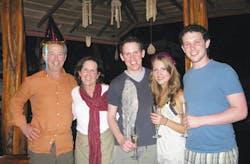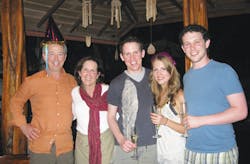The Business Sense
Also consider reading this article by Regina Dreyer Thomas:Hygienist provides dental care in retirement community
by REGINA DREYER THOMAS, RDH, BS, MPA
Today's dental hygiene students and practitioners know full well the multiple opportunities that abound in oral health care. Information is now more easily accessible through professional networks and resources. This wasn't always the case.
One hygienist, Lisa Solden Schildhorn, knew intuitively in her private practice days that increasing her knowledge base would ultimately expand her not-quite-fully-formed professional goals.
"When I graduated from the dental hygiene program at the University of Pennsylvania School of Dentistry in 1975, I wasn't quite sure what my next step would be," she said. "I was happy working in private periodontal practices in the Greater Philadelphia area, as well as for the dean of the dental school."
Stepping stones
During this six-year period, Lisa married and received her bachelor's degree in health education in 1981 from Temple University. This enabled her to both teach dental hygiene at the University of Pennsylvania and manage a clinic in the dental school, both of which she greatly enjoyed. But she knew there was something else out there for her that would build on her dental hygiene knowledge and experience.
When persistence met opportunity, she and another hygienist, Jane Forrest, opened a recruiting agency for dental professionals called Dental Power of Delaware Valley, Inc. "After seven years, I bought out the business from Jane," Lisa said. "I continued leading and managing my employees for another 14 years." She also had two children during that same time period.
"Leading a business enabled me to not only expand my business acumen, but also build a solid network of trust among my clients that has served me well in all my professional moves."
After 21 years, Lisa sold the business and pursued an M.S. in Organizational Development from the Pennsylvania College of Osteopathic Medicine. Her education gave her the background for helping organizations build capacity. She is currently an assistant teacher to the director of the leadership program at the school, and she consults for small businesses and nonprofit organizations.
"I've always been a community health advocate," she claims, "especially in the areas of children's oral health and breast cancer. The education and training I received during this period developed my interests and strengths in leadership and collaboration, and gave me the confidence to become an organizational and individual change consultant with a specialty in dental and health-care related services." Helping organizations build capacity, working with collaborative leaders to maximize resources, and coaching teams and individuals is the mission of her company, LLC Dental Team Consultants, Inc., formed in 2002.
Lisa's zeal for her work is clearly evident as she speaks of two projects she's involved in, both of which are funded by the DentaQuest Foundation, whose mission is "to promote and support optimal oral health."
"The Healthy Teeth, Healthy Children grant, awarded to the Pennsylvania chapter of the American Academy of Pediatricians by the DentaQuest Foundation, focuses on medical-dental collaboration, health literacy, and education," she said. "This grant provides funding for statewide training of pediatricians, family physicians, and nurse practitioners to assess the oral health of a child, apply fluoride varnish if applicable, and refer the child to a dental home. This means children have access to care very early in their development." (A dental home is a practice where children can go to receive continual care.)
Such a profound change in the delivery system has the potential to mitigate problems early for the many children that have ECC (early childhood caries). This whole concept of change is what drives Lisa's enthusiasm. She loves thinking of herself as a change agent, a concept readily promoted by the dental hygiene profession.
When asked who pays for this professional care, Lisa responds that most of the children receive Medicaid benefits or are beneficiaries of CHIPS (Children's Health Insurance Plan); thus the issue becomes one of finding providers, and that is where much of the challenge lies. Serving the underserved is key to improving the health of all, and is a central focus of Lisa's.
"My primary role on these state initiatives is to develop relationships of like-minded partners on every level, help build community networks, and maximize resources. I facilitate and plan so that all the partners are engaged in the process," she explains.
This dedicated professional's excitement mounts as she describes the second DentaQuest Foundation grant that involves the Pennsylvania Head Start Association, in partnership with the Massachusetts Head Start Association.
The Massachusetts Head Start Association is sharing their success with their Pennsylvania counterparts. Now Head Start programs all over Pennsylvania are being trained in an educational program called Cavity-free Kids. The training helps Head Start coordinators understand the importance of oral care, and helps them encourage and assist families in finding dental homes for their children.
"I have so many connections and long-term relationships from my dental employment agency that it's easy for me to connect the dots, be a good networker, and ask the right questions," said Lisa. "From my master's education, I'm trained in frameworks and theories, which gives me a different perspective. These skills serve me well. I'm able to structure a meeting where there's not only action at the end of the meeting, but there's a shared context from the beginning. We're all living and breathing partnership and collaboration to effect change."
She said that with this specific grant, the goal is to have all children provided with dental homes and the ability to get dental care. "I truly believe that we're really helping the kids that need care."
An initiative Lisa just finished was helping to build the organizational capacity of the Pennsylvania Oral Health Coalition, a group that promotes and identifies Pennsylvania-based oral health issues. Lisa and a partner helped them build their capacity to the point where they were able to hire a paid staff person, have clear roles and responsibilities for the steering committee and membership, and provide a case statement. "They now have the structure to move forward with their organization," she says.
The person inside the company
Philosophically, Lisa has an interesting point of view. "We all start with certain assumptions in our life. We grow up in a family that has its own culture and values, with friends and peer groups that influence our thought processes and assumptions. It's very easy to get stuck in these assumptions."
"When I got my master's degree in my 50s, it forced me to look at my assumptions differently," Lisa continued. "Having frameworks with which to see things has made me a more effective leader, and it's also made me a more effective person in some ways." She laughs as she says, "It's also been tough on the people around me!"
Yet this enthusiastic and upbeat woman is so enamored with her work that it's hard to tell she's had major health challenges in her life that might have stopped a different person in her tracks. Stage three breast cancer reared its ugly head about 12 years ago.
Talking about the event, she says that even though she'd routinely had mammograms and breast exams, she found a large lump during self-exam. This was particularly distressful, especially for her mother with whom Lisa is very close, because her younger, brain-damaged sister had recently had surgery for breast cancer. This all occurred before Lisa went back to school to get her master's degree, which, it turns out, was a true turning point in her life. As she told her mother, "Breast cancer isn't who I am."
"I wasn't particularly challenged by my breast cancer because I'm an optimist and I had a lot of support. I just plowed along. I was busy with my husband and two children while going through treatment, and was too busy and involved to feel sorry for myself. My business was intact, my children were intact, and my husband was intact, so I didn't see any reason not to move forward with my life."
But, "My mother was very emotional about it. I, of course, was dealing with my own emotions." When she told her mother she couldn't handle both her own and her mom's feelings, her mother immediately backed off. Lisa's respect and admiration of her mother is clearly evident, and they each consider the other her tower of strength.
One of Lisa's bumps in her career development is her issue with authority. "By owning and managing my own business, I never learned how to be politically savvy, and this was made clear to me when I became involved with nonprofit organizations." She has since learned how to deal with other leaders to bring about win-win situations.
In discussing her personal strengths, Lisa says, "I was blessed with the same gene my mother has, the optimism gene. I inherited her remarkable lack of defensiveness, too. What this means is that I can take feedback well."
Lisa credits her mother with being her inspiration. "She really has heavy shoulders. She may have had expectations about me being the good Jewish girl, but she also let me go on my own. She's still that way. She'd rather have me move forward than stay bound to what she needs from me."
"I think my biggest challenge was in organizational life once I sold my business, having to work with other leaders, and developing more political savvy. Going through the master's program where I learned different frameworks and learned about change and leadership has benefitted me significantly. I'm only limited by time and health."
Regarding her health, Lisa gets very bad infections in her arm from her breast cancer infusions and gets cellulitis very easily. But, she adds self-assuredly, "Nothing stops me. We're still traveling, I've been all over the world, and one of my sons just had a marvelous destination wedding." RDH
REGINA DREYER THOMAS, RDH, BS, MPA, is a retired dental hygienist who writes and presents programs on love and aging for health-care professionals. Her book, "Love & Successful Aging When You're 70+ and Single," is available in both print and as an e-book. To contact her, visit her website at www.loveat70.com for direct links to amazon.com and barnesandnoble.com, or email her at [email protected]
Past RDH Issues


